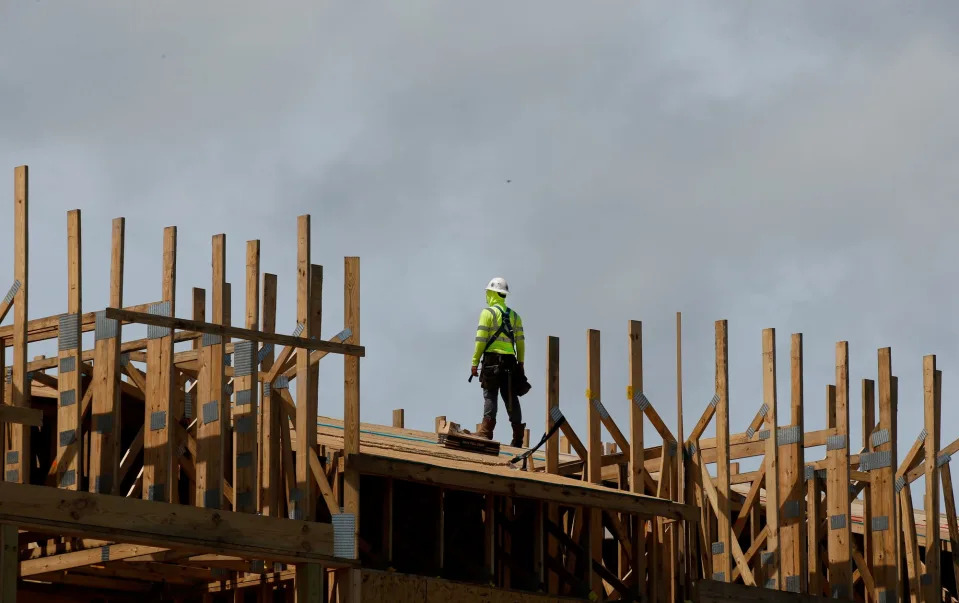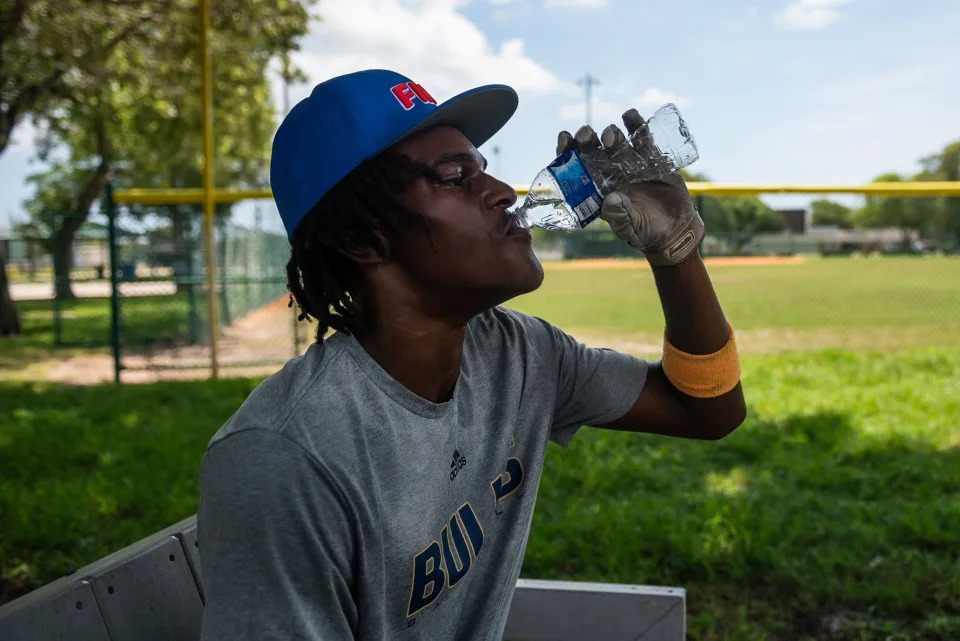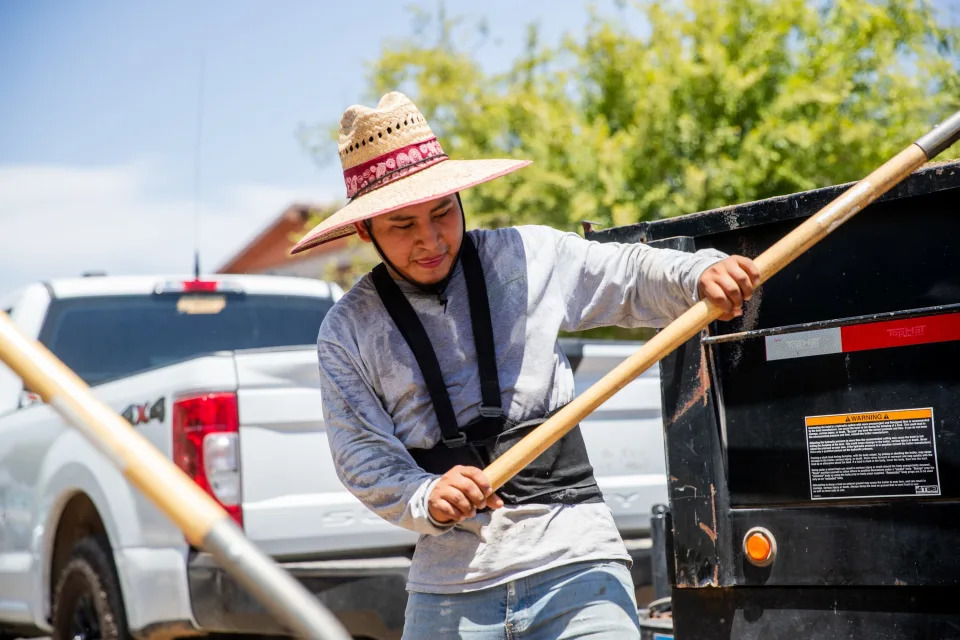Samantha Neely and Anthony Robledo,
USA TODAY NETWORK
Mon, April 15, 2024
Florida will become the second state to stop local governments from requiring heat protection for outdoor workers after Republican Gov. Ron DeSantis signed House Bill 433.
The law, which DeSantis signed last week, goes into effect on July 1 and establishes multiple restrictions for city and county governments, including the ability to set heat exposure requirements not already required under state or federal law.
Republican Rep. Tiffany Esposito of Fort Myers, who sponsored the House version of the bill, told reporters that her husband has worked in South Florida’s construction sector for two decades and that she knows the industry takes worker safety seriously.
"This is very much a people-centric bill,” Esposito said. “If we want to talk about Floridians thriving, they do that by having good job opportunities. And if you want to talk about health and wellness, and you want to talk about how we can make sure that all Floridians are healthy, you do that by making sure that they have a good job. And in order to provide good jobs, we need to not put businesses out of business."
Around two million people in Florida work in outdoor jobs, from construction to agriculture, according to the Union of Concerned Scientists. On average, the state's summer can reach up to 95 degrees, with the humidity and blazing sun making it feel well over 100 at times.
What is HB 433?
House Bill 433, referred to as the Employment Regulations Bill, says it seeks to "prohibit political subdivisions (city and county governments) from maintaining a minimum wage other than a state or federal minimum wage; prohibit political subdivisions from controlling, affecting, or awarding preferences based on the wages or employment benefits of entities doing business with the political subdivision; revise and provide applicability."
Regarding heat exposure protections, the bill's summary details it will prohibit political subdivisions from:
Requiring an employer, including an employer contracting with the political subdivision, to meet or provide heat exposure requirements not otherwise required under state or federal law.
Giving preference, or considering or seeking information, in a competitive solicitation to an employer based on the employer's heat exposure requirements.
The bill's analysis dives deeper into the decision to regulate heat exposure protections, saying the Occupational Safety and Health Administration (OSHA) has developed the best practices over the years. It adds that recognizing that preventing heat-related illnesses "requires education and close collaboration between employers and employees."
"Whereas local governments have started to adopt their own workplace heat exposure requirements, some of which apply only to specific industries, which ignore the individual responsibility of an employee to follow relevant guidelines and to protect himself or herself from heat-related illnesses, and rely on fines and penalties assessed on employers to fund the enforcement of such requirements," according to the bill.
Baltimore bridge collapse: Authorities recover fourth body from Key Bridge wreckage
Mon, April 15, 2024
Florida will become the second state to stop local governments from requiring heat protection for outdoor workers after Republican Gov. Ron DeSantis signed House Bill 433.
The law, which DeSantis signed last week, goes into effect on July 1 and establishes multiple restrictions for city and county governments, including the ability to set heat exposure requirements not already required under state or federal law.
Republican Rep. Tiffany Esposito of Fort Myers, who sponsored the House version of the bill, told reporters that her husband has worked in South Florida’s construction sector for two decades and that she knows the industry takes worker safety seriously.
"This is very much a people-centric bill,” Esposito said. “If we want to talk about Floridians thriving, they do that by having good job opportunities. And if you want to talk about health and wellness, and you want to talk about how we can make sure that all Floridians are healthy, you do that by making sure that they have a good job. And in order to provide good jobs, we need to not put businesses out of business."
Around two million people in Florida work in outdoor jobs, from construction to agriculture, according to the Union of Concerned Scientists. On average, the state's summer can reach up to 95 degrees, with the humidity and blazing sun making it feel well over 100 at times.
What is HB 433?
House Bill 433, referred to as the Employment Regulations Bill, says it seeks to "prohibit political subdivisions (city and county governments) from maintaining a minimum wage other than a state or federal minimum wage; prohibit political subdivisions from controlling, affecting, or awarding preferences based on the wages or employment benefits of entities doing business with the political subdivision; revise and provide applicability."
Regarding heat exposure protections, the bill's summary details it will prohibit political subdivisions from:
Requiring an employer, including an employer contracting with the political subdivision, to meet or provide heat exposure requirements not otherwise required under state or federal law.
Giving preference, or considering or seeking information, in a competitive solicitation to an employer based on the employer's heat exposure requirements.
The bill's analysis dives deeper into the decision to regulate heat exposure protections, saying the Occupational Safety and Health Administration (OSHA) has developed the best practices over the years. It adds that recognizing that preventing heat-related illnesses "requires education and close collaboration between employers and employees."
"Whereas local governments have started to adopt their own workplace heat exposure requirements, some of which apply only to specific industries, which ignore the individual responsibility of an employee to follow relevant guidelines and to protect himself or herself from heat-related illnesses, and rely on fines and penalties assessed on employers to fund the enforcement of such requirements," according to the bill.
Baltimore bridge collapse: Authorities recover fourth body from Key Bridge wreckage
What are Florida's statewide heat exposure protections?

Construction workers work in the heat of the midday sun in Daytona Beach, Florida, on Sept 14, 2021.
Despite outlining in its summary that counties and cities would have to adopt the state's stances on heat exposure protection, Florida does not have any statewide standard. However, the bill's text heavily supports OSHA's guidelines regarding the subject.
Florida is under federal OSHA jurisdiction, which covers most private-sector workers within the state. State and local government workers are not covered by federal OSHA.
OSHA has a “general duty clause" that requires employers to provide workplaces “free from recognized hazards that are causing or are likely to cause death or serious physical harm.” That includes heat-related hazards that are likely to cause death or serious bodily harm.
What does HB 433 mean for workers in Florida cities and counties?
Overall, the legislation would make any local heat protection measures "void and prohibited," within all 67 Florida counties.
In Miami-Dade County, this legislation would kill the county's proposal to require 10-minute breaks in the shade every two hours for any outdoor construction or farm workers. After negotiating for years, county commissioners had the item on their agenda up until the law was signed.
In a Friday press conference, DeSantis addressed the bill, saying "there was a lot of concern out of one county, Miami-Dade.
"And I don't think it was an issue in any other part of the state," he said. "I think they were pursuing something that was going to cause a lot of problems down there."
Luigi Guadarrama, political director of the Sierra Club Florida, said in a statement that the new law is the latest example of DeSantis failing the state’s environment, economy and workers.
“Instead of addressing the skyrocketing crisis of protecting our workforce, the governor chose to abandon millions of hard-working Floridians and leave our state more vulnerable to the impacts of climate change,” Guadarrama said. “He has consistently ignored the real issues affecting Florida's families to appease his donors and large corporations.”
How many heat-related deaths does Florida have a year?

Prince Ferguson cools off in the shade and drinks water after batting practice at Pompey Park on Wednesday, June 28, 2023, in Delray Beach, Florida.
From 2010 to 2020, the University of Florida recorded 215 heat-related deaths occurred in Florida, with the number of yearly deaths varying between 10 and 28.
According to the Centers for Disease Control and Prevention, average annual heat-related deaths have risen 95% from 2010 to 2022, with about 1,200 people in the U.S. dying every year from them.
Florida is projected to experience more days of extreme heat this summer (when temperatures are at least 95 degrees), compared to averages over the last 30 years, according to the Florida Climate Center at Florida State University.
What other state ended local heat protection ordinances?
Texas halted the ability of city and county governments to mandate protections for outside workers last year with House Bill 2127.
Republican Gov. Greg Abbott signed the bill on June 13 and it went into effect on Sept. 1. The law ended safeguards like the city of Austin's 2010 ordinance mandating construction sites offer rest and water breaks for at least 10 minutes every four hours and the city of Dallas' similar ordinance in 2015.
San Antonio was considering a similar measure ahead of HB 2127's approval.
What states have heat protections in place?

Cleverson Gomez sweats through his shirt as he shovels dirt in Surprise, Arizona on July 26, 2023, when temperatures for the day hit 116 degrees. Arizona is among the states that experience extreme heat but do not have statewide heat protections for its outdoor workers.
Only five states offer statewide heat protections, with California being the first after four farm workers died of heat stroke in 2005.
The following states require employers to provide shade and water amidst soaring temperatures:
California
Colorado
Minnesota
Oregon
Washington
This article originally appeared on Fort Myers News-Press: Heat protections for outdoor workers banned in Florida with new law
DeSantis Signs Florida Bill Blocking Local Heat Safety Rules For Workers
Dave Jamieson, Alexander C. Kaufman
Mon, April 15, 2024
Failed presidential candidate Gov. Ron DeSantis (R) signed a bill late last week barring Florida localities from requiring employers to provide outdoor workers with access to water, rest and shade, outraging workplace safety advocates who say the new law will kill people.
Backed by the agricultural and construction industries, the controversial legislation is what’s known as a “preemption” law: It forbids cities and counties from pursuing their own ordinances on a particular subject, in this case protections from extreme heat.
The law effectively nullifies a proposal in Miami-Dade County that would require some employers to maintain a heat safety program and provide employees with water and shade on hot days. The county commission recently withdrew the proposal after the state legislation put its legality in doubt.
The preemption bill recently passed the Republican-controlled state House and Senate, along with a similar measure that prevents jurisdictions from requiring employers to pay livable wages on government-funded projects.
Unions and other progressive groups said blocking heat regulations would endanger farm and construction workers and anyone else who labors in one of the hottest states in the country.
“Someone is going to die as a result of this legislation,” Kim Smith, a telecommunications technician, told HuffPost last month.
Last year, Texas Republicans passed a similar preemption bill that blocked localities from implementing heat protections as well as other ordinances related to housing and labor. The legislation, known as Texas’ “death star bill,” appeared designed to thwart local laws in Austin and Dallas that guaranteed water breaks for workers.

The bill Gov. Ron DeSantis (R) just signed blocks jurisdictions like Miami-Dade County from implementing their own heat safety standards. SOPA Images via Getty Images
Florida Republicans pushing for the preemption law said they wanted to avoid a “patchwork” of local regulations around the state related to heat safety, arguing the matter was better left to the federal Occupational Safety and Health Administration.
But OSHA does not yet have a heat-specific safety rule, and proposals to create a uniform, statewide standard in Florida have gone nowhere over the years because of a lack of Republican support.
More than 430 workers have died due to environmental heat exposure since 2011, according to OSHA. But relatively few jurisdictions have laws in place that require employers to provide water, shade and heat safety training. Just three — California, Oregon and Washington — mandate heat breaks for outdoor workers. Minnesota has heat standards for indoor workers, while Colorado does for farmworkers.
“Overheating is one of the most common and most serious dangers in the workplace,” Rep. Alma Adams (D-N.C.), who recently co-authored a federal bill ordering OSHA to regulate heat exposure, told HuffPost. “Is requiring a glass of water and some shade too much to ask?”
Climate change is making heat waves both more intense and more frequent, raising fears that a growing number of workers could die if governments don’t implement safety measures.
A farmworker in Miami-Dade County died last July during what would become the hottest month ever recorded. The man’s family told NBC South Florida that he’d recently suffered symptoms consistent with heat stress. A farmworker in the county told HuffPost last month that the foreman at the plant nursery where he works prohibited even 30-second breaks in the blazing sun since this is the busiest growing season for exotic flora.
The Biden administration is currently crafting a federal heat safety standard through OSHA, but federal rules take years to develop, often face litigation and can be undermined by subsequent administrations. Former President Donald Trump could simply drop pursuit of the rule if he defeats Biden in their expected rematch in November.

No comments:
Post a Comment